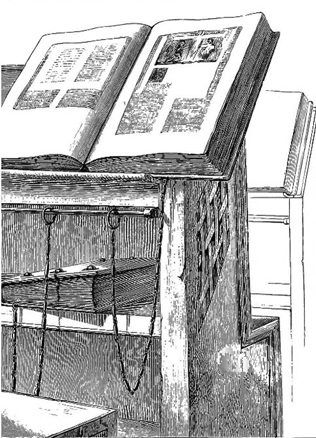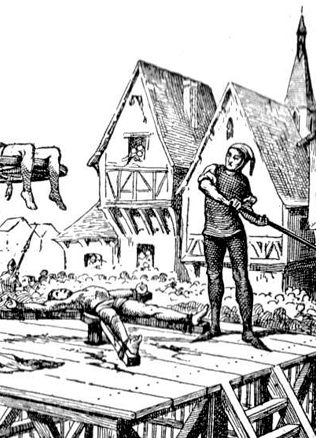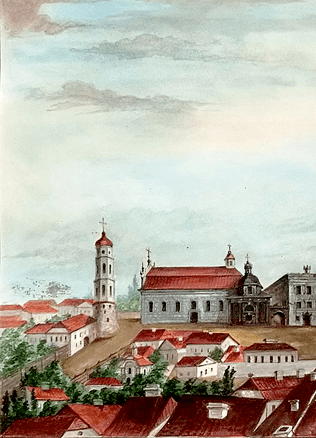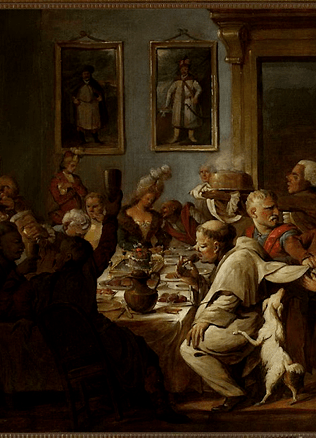Changing Religion in the GDL: Conversion and Apostasy
Apostasy (Greek: apostasis), the abandonment of the religion given by parents, and conversion (Latin: conversion), the adoption of a new religion due to different pragmatic motives, were seen as controversial decisions in the Grand Duchy of Lithuania. The messianic Catholic Church worked consistently to expand the circle of believers; it considered the conversion – voluntary or instigated – of every non-Christian a positive, expected and desirable move, even when a newly-baptised person, who had to leave his previous community, found it hard – or even impossible at times – to adapt in the new environment. For a Jew or a Tatar coming from the societies with traditional attitudes towards religion, rejecting their faith and becoming Christians meant tearing apart each and every bond with his family and community; it also meant leaving the accustomed environment and starting a new life. People who organised missions to work among non-Christians always spoke about the improvement of material and social status of the newly christened. They realised that disadvantageous and tough everyday life does not help the people strengthen their new faith and guarantee its long-term continuity; on the contrary, they tend to abandon Christianity.
The stimulation program for converted Christians
The motives that encouraged non-Christians to turn to Christianity were different and individual, from an attempt to leave a marginal group of the society and a strive for material and social wellbeing to a sincere call of heart that cannot be ignored.
There was a legal provision in the GDL that every newly baptised non-Christian becomes a subject of nobilitation, in other words, becomes a member of the nobility.
It is likely that Tatars were able to reap greater benefits given that opportunity due to some specific features of their social status as they would receive land for military service. Several Tatars started extended families of the nobility the members of which would not hesitate to reveal their Tatar origins in their genealogy, for instance the Glinski family.
Jews would react painfully to every person abandoning Judaism. Historical sources feature stories by Christian priests or ready-to-be-baptised Jews who complained about the siege of a church organised by the Jew’s family trying to disrupt the ceremony of baptism with noise and threats. Anticipating possible impact on their communities, Jews were sceptical towards Christians wishing to adopt Judaism and join their community. The Lithuanian Vaad issued several decrees in the middle of the 17th century that prevented the Christians converted to Judaism from joining Jewish communities and banned the popularisation of Judaism in the society. It is likely that there was a background for that kind of decisions.
The fight against religious migration
With Christianity dominating throughout the GDL, the instances of apostasy were very rare and people tended not to talk about such cases that were discommended by the state and the Church. Some cases of abandoning Christianity were real while some were legendary, but the society of the GDL was experiencing periodical upsurges of interest in Islam and Judaism (Antitrinitarians faced this kind of accusations in the 16th century) caused by fear of non-Christian religions. Were the reasons behind that fear real?
Paweł Holszański, the bishop of Vilnius, raised the problem in public in the early 16th century when he spoke of Jews and Tatars living with unmarried non-Christian women, his fear being that their children would become Jews and Muslims rather than Christians. The Third Statute of Lithuania features legal means to prevent potential domination of non-Christian religious influence and domination against Christians. They included banning non-Christians from taking any key office that could help them influence Christians; the Statute also prohibited Jewish and Tatar noblemen from persuading peasants living in their estates to accept non-Christian religions; Christian women were not allowed to breastfeed non-Christian babies.
The Statute imposed a strict ban on spread of Judaism and Islam among non-Christians threatening to burn offenders at the stake.
During local sejmiks, the nobility of the GDL would often raise the issue of hiring Christian maidservants by Jewish families; they used to blame the latter of seducing the maidservants, influencing their religious beliefs and preventing them from fasting. It must be said that similar sanctions were common throughout the whole Europe.
Rejecting Christianity equals dementia
Historical sources of the GDL provide concrete cases of apostasy by Christians. Marcin Matusewicz, a nobleman, wrote down in his diary a story he heard from his father.
Jeska, a noblewoman who liked reading books, especially the Bible, understood it wrongly “with her female brain” and became friends with a Jew who rented some land from her estate; she started celebrating Sabbath and other Jewish holidays with him.
She eventually ended up in Amsterdam where she fled together with her daughters and the tenant where she converted to Judaism. Her husband, who wished to bring his family back, also turned to Judaism. (The author of the diary says that his “close bonds with the wife” was the main reason behind that decision.)
Do You Know?
Edward Kotłubaj, who wrote the biographies of the members of the Radvila family in the 19th century, attributed interest in alchemy, “philosophical stone” and Judaism to Marcin Radziwiłł: “[He] started imagining that the Jewish faith is the best one and seriously decided to become a Jew. [He] hired teachers in the Hebrew language and dogmas of Judaism. He inhabited his estate exclusively with Jews, expelled all Christians from there and abided Sabbath and kosher pedantically.”
It was his family that prevented him from converting to Judaism as it started looking after the duke (whom they considered suffering from dementia) and after his young children. Some sources indicate that the duke “dreamt about Judaism” until his death.
Jurgita Šiaučiūnaitė-Verbickienė



